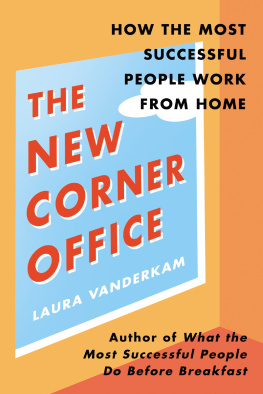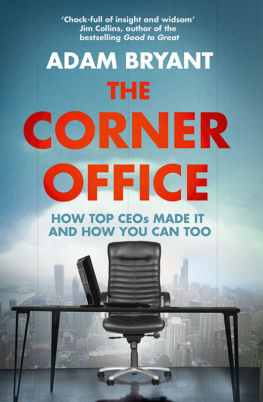STEALING THE CORNER OFFICE
STEALING THE CORNER OFFICE
THE WINNING CAREER STRATEGIES
THEYLL NEVER TEACH YOU
IN BUSINESS SCHOOL
By
BRENDAN REID

Copyright 2014 by Brendan Reid
All rights reserved under the Pan-American and International Copyright Conventions. This book may not be reproduced, in whole or in part, in any form or by any means electronic or mechanical, including photocopying, recording, or by any information storage and retrieval system now known or hereafter invented, without written permission from the publisher, The Career Press.
STEALING THE CORNER OFFICE
EDITED BY JODI BRANDON
TYPESET BY EILEEN MUNSON
Cover design by Howard Grossman
Printed in the U.S.A.
To order this title, please call toll-free 1-800-CAREER-1 (NJ and Canada: 201-848-0310) to order using VISA or MasterCard, or for further information on books from Career Press.

The Career Press, Inc.
220 West Parkway, Unit 12
Pompton Plains, NJ 07444
www.careerpress.com
Library of Congress Cataloging-in-Publication Data
Reid, Brendan.
Stealing the corner office : the winning career strategies theyll never teach you in business school / by Brendan Reid.
pages cm
Includes index.
Summary: Stealing the Corner Office is mandatory reading for smart, hardworking managers who always wonder why their seemingly incompetent superiors are so successful. It is a unique collection of controversial but highly effective tactics for middle managers and aspiring executives who want learn the real secrets for moving up the corporate ladder. Unlike virtually all other business books--which are based on the assumption that corporations are logical and fair--Stealing the Corner Office explores the unconventional tactics people less competent than you use to get ahead and stay ahead. It is your proven playbook to thrive and win in an imperfect corporate world-- Provided by publisher.
ISBN 978-1-60163-320-0 (paperback) -- ISBN 978-1-60163-441-2 (ebook) 1. Exec- utives--Promotions. 2. Career development. 3. Success in business. I. Title.
HD38.2.R446 2014
658.409--dc23
2014003194
Authors Note
All company names referenced in this book are fictitious. They are used to make the stories more enjoyable. Any likeness to a real company is accidental.
For my parents,
who gave me the gift of self-belief.
And for Aya,
who taught me the power of dedicating
yourself to something you love.
Acknowledgments
First, thanks to Aya for her unwavering love and support, and to my parents for giving me the personal strength to take on my goals without fear or reservation.
Thanks also to my close friends who were with me before my professional journey even started. I hope you know how much your loyalty means to me.
A special thanks to the managers and executives Ive worked with who taught me that there is no single blueprint to success in the human corporation.
Finally, thank you to Arnold who saw potential in my work when many others did not.
Contents
Chapter 1:
Your Playing Field: Dispelling the Myth of Meritocracy
Chapter 2:
Your Mindset: Why You Have All the Wrong Priorities
Chapter 3:
Your Competition: Whos Really Getting Ahead in Your Company?
Chapter 4:
Your Playbook: 7 Lessons to Steal the Corner Office
Chapter 5:
Checkpoint: Your New Career Perspective
Chapter 6:
Action: What You Can Do Tomorrow to Get Ahead
Conclusion:
Your Wakeup Call: Now, Make It Happen
Introduction
Im afraid to say I spent the first half of my career doing exactly all the wrong things to get ahead. Somewhere in my formative years, like many young managers, I got it into my head that the secret to success came from being smarter, working harder, and executing reliably. Ive since learned that these pearls of conventional wisdom are not, in fact, the beacons to success in the corporate world Ive come to know. But who could really blame me? The rhetoric is everywhere.
Be results orientednever.
Hold people accountablenope.
Be passionate about your ideasdefinitely not.
We treat these mantras as gospel and to argue against them is business sacrilege. I dare you to go into your next management meeting and tell the CEO that its really not all about resultssee what happens. Walk down the hall and tell your staff that whatever they do, do not, under any circumstance present or pursue ideas with too much passionwatch the looks you get. This mindset has been drilled into us decade after decade, school after school, meeting after meeting. Its simply not up for debateuntil now, I hope.
It seems every great success story begins with hard work and passion, and ends with fame and fortune.
Margaret Thatcher told us, I do not know anyone who has gotten to the top without hard work. That is the recipe. The Iron Lady cant be wrong, can she? But then, how does she account for my former boss who thought CAGR was his favorite local radio station? Utterly inept at business analysis, but he had a summer house on Cape Cod. That recipe doesnt sound right, does it?
Colin Powell said, A dream doesnt become reality through magic; it takes sweat, determination, and hard work. Okay, but what about the operations VP I worked with who thought a scattergraph was some hot new Instagram feature? Zero business acumen, but he made a fortune on the acquisition. Sounds like magic to me.
What took me 15 years to learn is that much of what we hold to be true about success in business is not really true at all. All this rhetoric we honor as fact is mostly just what successful people preach to justify the validity of their own successes. Can you blame them? Nobody goes to sleep at night thanking the heavens they were able to game the corporate system and get ahead in spite of their glaring incompetence. So we recite these half truths about hard work and results orientation and passion to placate ourselves.
After many years of toil and frustration, Ive come to realize this long-held perspective is not actually rooted in the reality of modern corporate life, and that following the conventional game plan doesnt give you the best chance to move up the ladder. Im going to share with you why that is and how you can use this knowledge to your advantage.
Before you dismiss me as a grumpy, old cynic with a case of sour grapes, let me make a few important distinctions. First off, Im not saying all successful businesspeople are incompetent. There are many smart, successful people out there. Id venture to say at least half of all the successful executives I know are undeniably intelligent, passionate, and driven. Theyve followed the classical success playbook to a T and made it work. But heres the thing: I dont think these people have nearly as much to teach us about getting ahead as their equally successful but far less talented other half, the group I lovingly call the Incompetent Executives.
The temptation will be to label this line of thinking as cynicism. But before you do, take a good look around you and ask yourself honestly who is getting ahead in your company and why.
How many of these executives are intelligent and innovative? How many of them seem inexplicably lucky? And how many of them are actually drooling right now?
In my experience, the fastest path to getting ahead is to learn the secrets of the group we dont like to talk about: the Incompetent Executivesthe average and below-average managers who make it big: your idiot boss, the useless marketing VP, your half-witted neighbor, the strategic alliances guy. You know these people as well as I do. Teflon Executives, a friend of mine calls them. No matter what happens, they always end up on top and yet they seemingly do nothing at all. How are these people getting ahead, and what do they know that you dont? Im going to let you in on their secrets and give you an inside look at the most important pages from their playbook.
Next page






